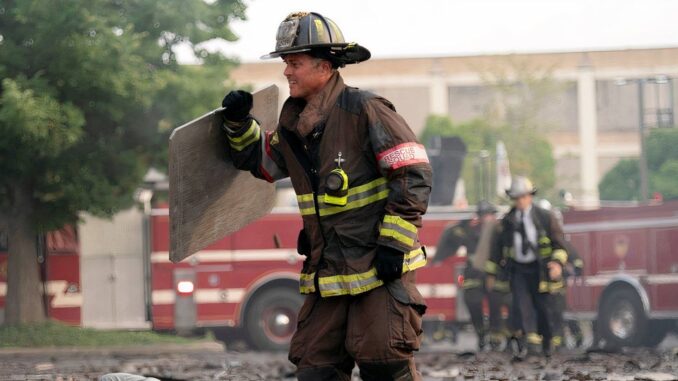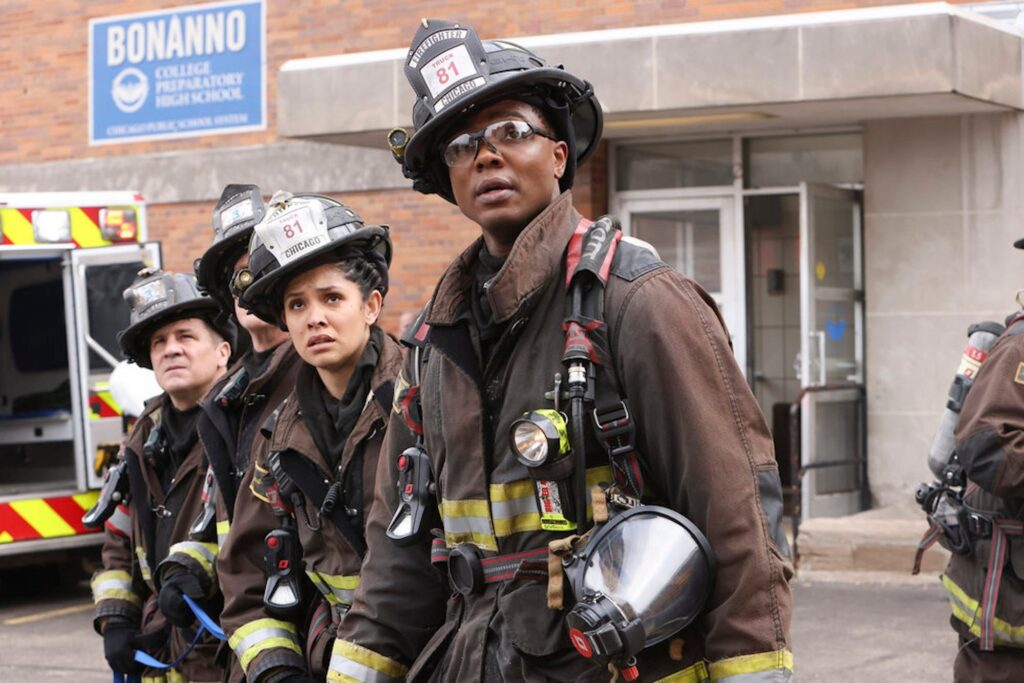
Despite maintaining its position as NBC’s top-rated scripted drama, Chicago Fire Season 13 is grappling with underlying issues that threaten its long-standing success. Since its debut in 2012, the firefighter-centric series has captivated audiences with its realistic portrayal of rescue work. However, recent changes, including significant cast departures and shifts in storytelling focus, have left the show struggling to retain its audience.
Firehouse 51 Faces Major Changes in Season 13
One of the most significant shifts in Season 13 was the departure of Fire Chief Wallace Bowden (Eamonn Walker), a cornerstone of Chicago Fire since its inception. His exit marked a turning point for the series, paving the way for Dom Pascal (Dermot Mulroney) to take over as chief. Unlike Bowden’s collaborative leadership style, Pascal’s stricter approach has sparked tension within Firehouse 51, particularly with veterans Kelly Severide (Taylor Kinney) and Stella Kidd (Miranda Rae Mayo).
Other cast shakeups have also added to the season’s challenges. Jack Damon (Michael Bradway) was transferred out after repeatedly defying orders, and fan-favorite Joe Cruz (Joe Miñoso) faces potential career ruin after being blackmailed into a disastrous robbery involving Firehouse 51. These plotlines, while dramatic, may have contributed to the series losing some of its original appeal.
A Ratings Powerhouse with Hidden Vulnerabilities
On the surface, Chicago Fire remains a ratings juggernaut. It is NBC’s top-rated scripted show, pulling in 4.8 million viewers and ranking second overall on the network behind Sunday Night Football. Among broadcast television programs, it holds the fourth spot, solidifying its dominance in primetime drama.
Additionally, the One Chicago franchise continues to perform well, with Chicago Med and Chicago PD ranking just behind Fire. This demonstrates the enduring appeal of the interconnected universe despite its age and numerous cast changes. However, beneath the impressive ratings lies a troubling trend: an 8% decline in viewership compared to Season 12.

What’s Behind the Decline?
Several factors may explain why Chicago Fire is losing viewers:
- The Departure of Bowden: As a beloved character since the series’ start, Bowden’s absence has left a void that Pascal’s abrasive leadership has struggled to fill.
- Storytelling Fatigue: After 13 seasons, the show has leaned heavily on soap opera-like personal drama, such as Cruz’s blackmail arc, rather than the high-stakes rescue missions that once defined it.
- Post-Strike Industry Challenges: The lingering effects of the 2023 writers’ and actors’ strikes have disrupted the TV landscape, leading to a general decline in viewership across the board.
While Chicago Fire remains popular, these issues pose a threat to its dominance, especially as Chicago Med closes the gap and risks overtaking its sister show in the ratings.
How Chicago Fire Can Reignite Its Flame
To regain its former glory, Chicago Fire needs to return to its roots: compelling, realistic rescue missions and the inherent dangers of firefighting. In its early seasons, the show stood out for its authenticity and emotional depth, often exploring life-and-death stakes that resonated with viewers.
Chief Pascal’s mission to reform Firehouse 51 offers an opportunity to balance workplace politics with the high-octane rescue stories fans love. By weaving these elements together, the series can create a fresh yet familiar narrative that captures the tension and camaraderie at the heart of Firehouse 51.
Ultimately, Chicago Fire must prioritize the stories that made it a standout in the first place—rescue missions that test its characters’ bravery and resolve—while using the evolving dynamics at Firehouse 51 to keep the drama grounded and engaging.